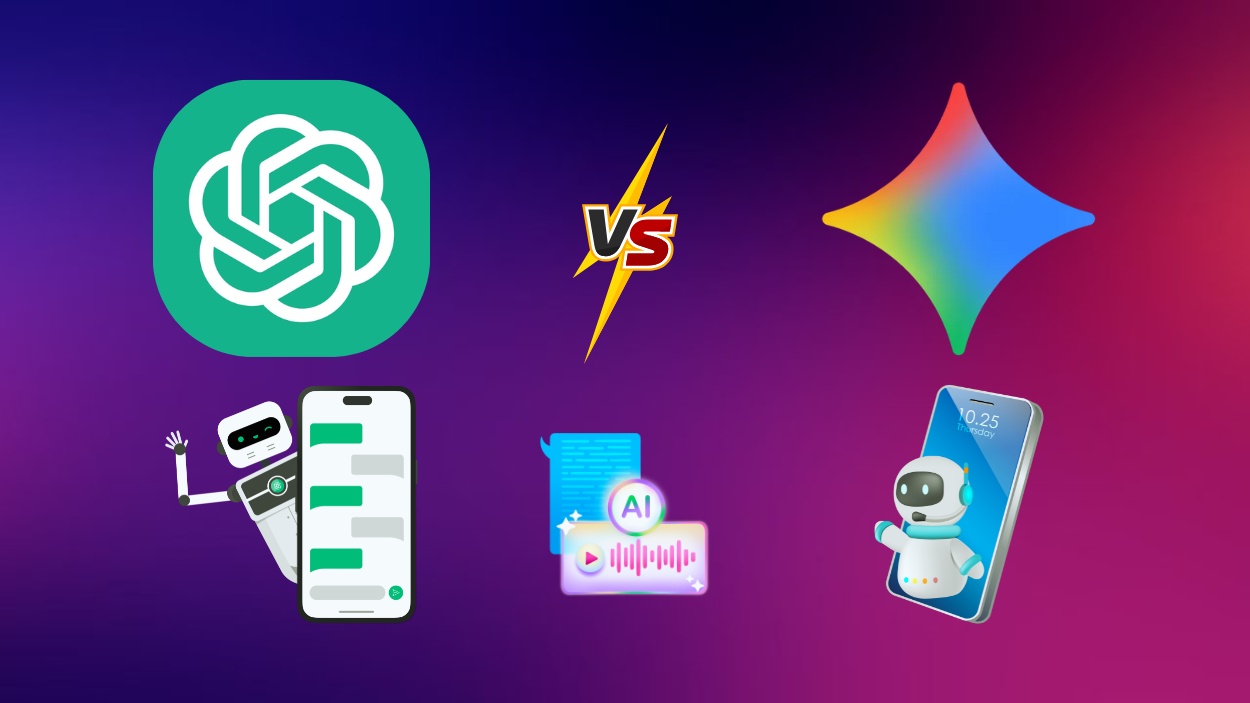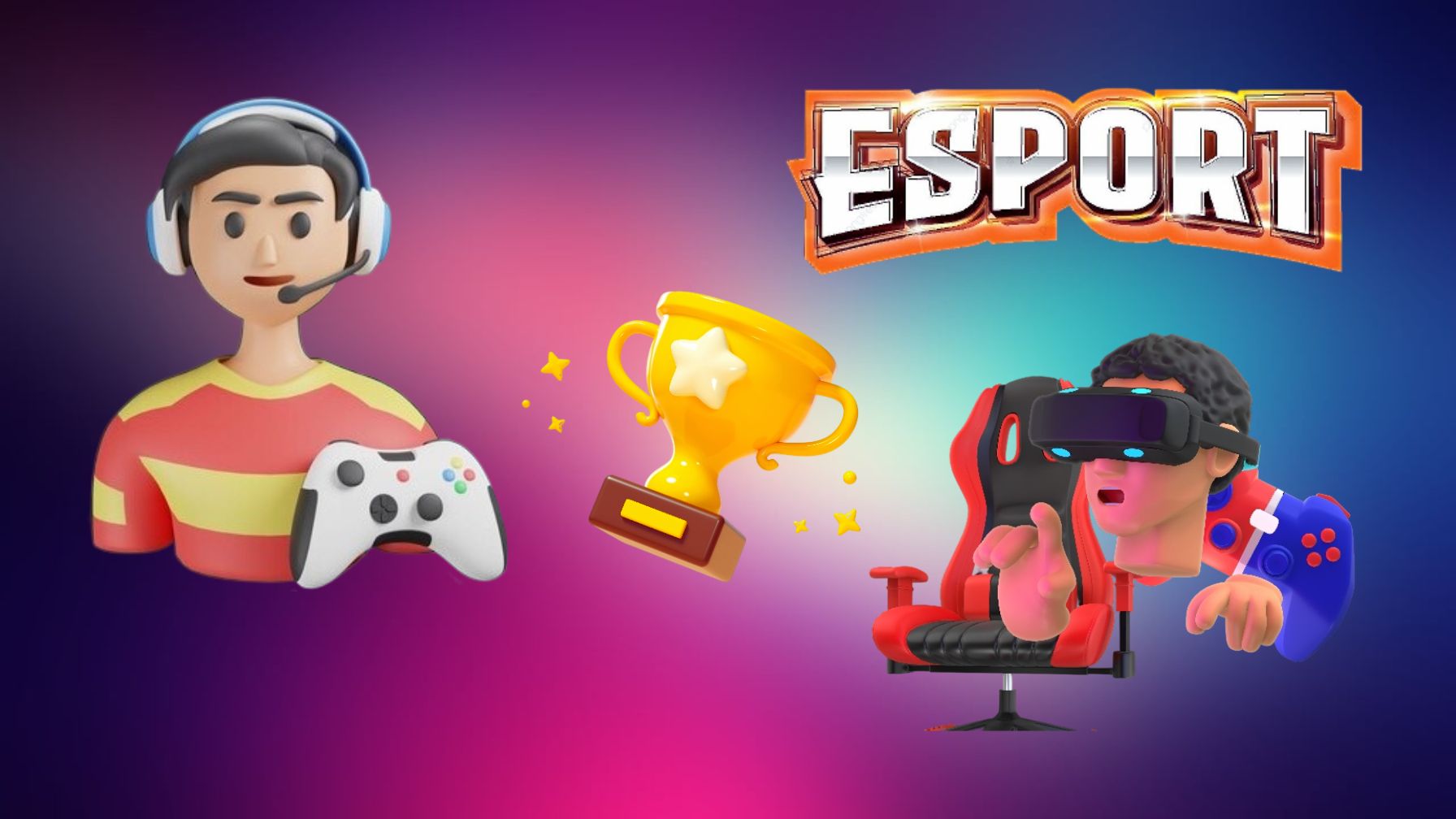The rivalry between ChatGPT and Google Gemini defines the generative AI landscape. ChatGPT remains the leader in active engagement, while Gemini closes the gap through mass distribution. From corporate reports to web traffic studies, figures speak clearly about adoption, reach, and momentum. Explore what makes each platform stand out, and what lies ahead.
Editor’s Choice
- 800 million weekly active users for ChatGPT as of October 2025, a 4× year-over-year increase. Users spend an average of 16 minutes per day and submit 2.5–3 billion prompts daily.
- ChatGPT processes 1+ billion queries daily, with 190.6 million daily users and 5.72 billion monthly visits.
- 450 million monthly active users for Google Gemini by July 2025, up from 400 million just two months earlier.
- 35 million daily active users for Gemini as of early 2025, a nearly 4× jump from October 2024.
- Google Search’s AI Overviews feature, integrated with Gemini, now reaches 2 billion monthly users, up from 1.5 billion in May 2025.
- ChatGPT accounts for roughly 60% of all AI-related web traffic, far ahead of competitors.
- For each Gemini text prompt, AI inference now consumes 0.24 Wh, a 33× energy reduction and 44× lower carbon footprint compared to a year earlier.
Recent Developments
- ChatGPT expanded to 800 million weekly active users, with users submitting up to 3 billion prompts per day.
- Gemini hit 450 million monthly active users by mid‑2025, reflecting sustained growth.
- Gemini’s DAU count of 35 million shows meaningful uptake in daily usage.
- Google Search’s AI Overviews, leveraging Gemini, now serve 2 billion monthly users, broadening its AI exposure.
- Gemini’s infrastructure efficiency improved sharply, 33× energy savings, 44× reduced carbon footprint per prompt.
- ChatGPT remains central in AI traffic, capturing 60% of AI‑related web visits.
- Gemini’s integration into Android and localization for India, with 12 regional languages, boosted adoption significantly.
Use Case Statistics (Coding, Summarization, etc.)
- The most common use of ChatGPT is general research (36–37%), followed by academic research (18–19%), coding (14–15%), and email (14%).
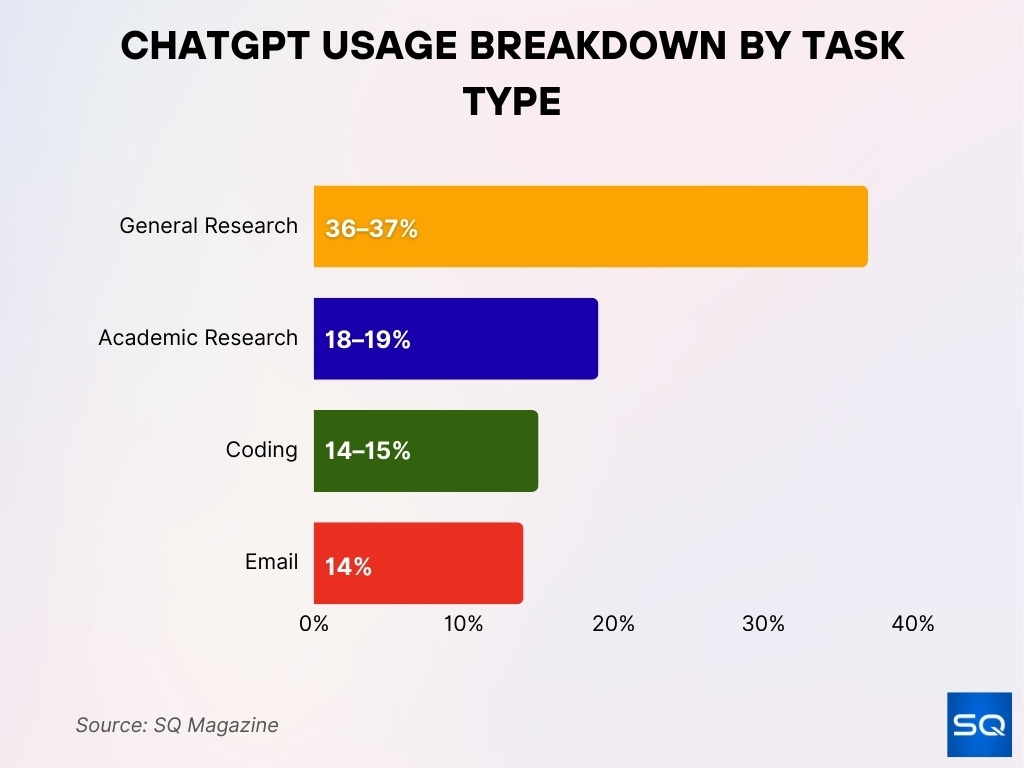
- 65% of marketers regularly use ChatGPT for brainstorming and campaigns.
- 63% of developers rely on ChatGPT for debugging and code.
- Gemini delivers stronger research accuracy, while ChatGPT excels in creative text.
- Gemini is considered more cost-effective for coding use cases.
User Base and Growth Statistics
- 800 million weekly active users, up 4× year-over-year.
- Processes over 1 billion queries daily across 5.72 billion visits per month.
- 190.6 million daily users, equating to 2,206 visits per second.
- An estimated 600 million monthly active users by March 2025.
- About 10 million “Plus” subscribers globally.
- 450 million monthly active users by July 2025.
- Mid‑2025 reports of 400 million monthly users, up sharply from Q4 2023’s 7 million.
- 35 million daily active users, nearly 4× growth from October 2024.
User Engagement and Retention Rates
- Users average 16 minutes per day on the platform with 2.5–3 billion prompts daily.
- Daily usage reflects deep engagement, with over 190 million users across 1 billion+ queries per day.
- Session counts average around 4 minutes and 40 seconds per visit.
- Direct traffic makes up over 76% of visits, while organic search contributes around 17%.
- Bounce rates (Feb 2025): desktop 27.1%, mobile 44.8%.
AI Tool Usage by Age Group
- OpenAI / ChatGPT was the most used tool across all age groups, with 51% usage among those aged 45–54, and 46% of the general population reporting use.
- Google Gemini saw strong cross-demographic engagement, used by 37% of the general population, with slightly higher adoption in the 30–44 (39%) and 45–54 (40%) age groups.
- Microsoft Copilot was most popular among the 18–29 demographic (28%), while only 20% of the 45–54 group used it.
- Meta Llama had low overall usage, peaking at 14% among 18–29s, and dropping to just 3% for ages 45–54 and 55+.
- Anthropic Claude remained niche, with 8% usage among 18–29s, and only 1% of users aged 45–54 engaged with it.
- Perplexity AI was used by 10% of those aged 55+, despite only 5% usage among the general population.
- “Other” AI tools saw a notable rise in older demographics, with 26% of those aged 55+ using alternatives, compared to just 14% among 18–29s.
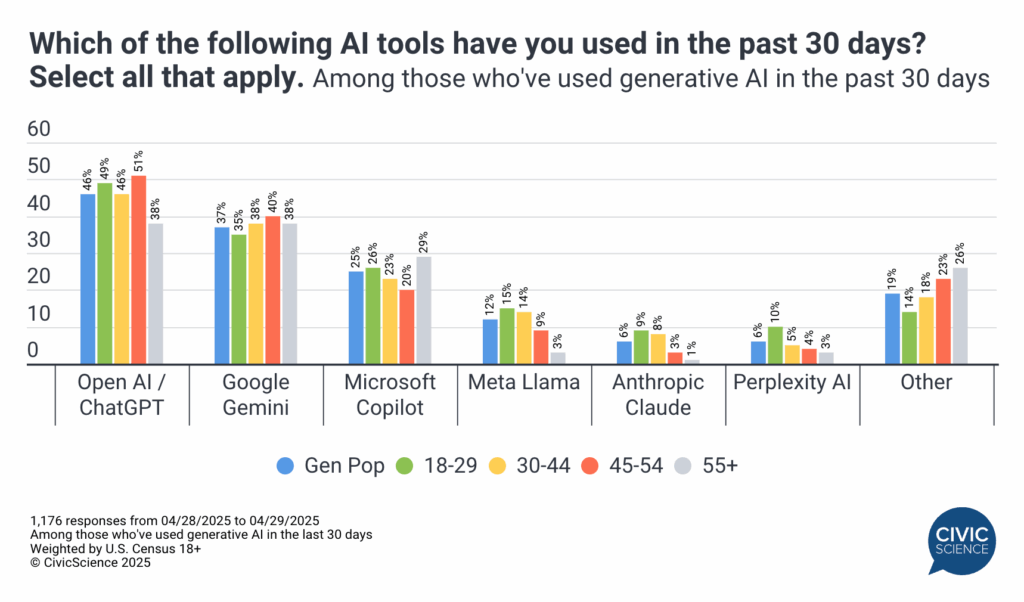
Geographic Distribution of Users
- The U.S. accounts for ~15.1% of traffic.
- The U.S. represents 14.6% of Gemini’s traffic.
- Accessible from 230+ countries and territories.
- In India, Gemini’s usage surged thanks to local language support and Android integration.
Performance in Research Tasks
- ChatGPT-5 sets a new benchmark with a 94.6% score on AIME 2025 math problems, significantly outperforming earlier versions.
- In real‑world coding, GPT‑5 achieves 74.9% on SWE‑bench Verified and 88% on Aider Polyglot.
- Gemini 1.5 Ultra scores 93.4% on the MMLU benchmark, the top score among 2025 commercial models.
- On Big‑Bench Hard, Gemini lands 87.9%, beating GPT‑4 by 3.8 percentage points.
- Gemini’s code generation accuracy is 81% on the HumanEval Python test.
- ChatGPT‑4o scores 88.7% on MMLU, ahead of GPT‑4’s 86.5%.
- On software‑engineering tasks, ChatGPT responses contain 52% inaccuracies and 77% verbosity, highlighting room for growth.
ChatGPT vs. Google Gemini: Key Feature Highlights
- ChatGPT specializes in text-based interactions, making it ideal for conversation, summarization, and written content generation tasks.
- ChatGPT supports numerous API plugins, allowing advanced users to integrate tools for code execution, data retrieval, and productivity workflows.
- Google Gemini excels in multimodal AI, enabling users to process text, images, video, and audio within the same interaction.
- Gemini integrates seamlessly with Google services such as Docs, Gmail, Search, and YouTube, giving it a native edge for productivity within the Google ecosystem.
- Gemini emphasizes real-world context understanding, positioning itself as a more situationally aware assistant in real-time and cross-platform use cases.

Language and Reasoning Capabilities
- GPT‑5 delivers high performance in health (46.2%) and multimodal understanding (84.2%) on HealthBench Hard and MMMU, respectively.
- GPT‑4o extends strong voice, multilingual, and vision skills, supporting over 50 languages.
- GPT‑4o still powers 65% of ChatGPT queries due to its multimodal strength.
- Gemini’s MMLU score of 93.4% confirms its advanced reasoning performance.
- GPT‑4.5 also reaches ~88.7% on MMLU, over GPT‑4o in multilingual settings.
- ChatGPT‑4o overgeneralizes scientific findings 26–73% of the time.
- Error rates vary by domain, from 8–83% in healthcare, 15–20% in economics, to 20–30% in engineering tasks.
Accuracy Comparison
- GPT‑5 reduces hallucination sharply to 1.4%, improving over GPT‑4 (1.8%) and GPT‑4o (1.49%).
- Gemini 2.5 Pro records a 2.6% hallucination rate, slightly higher than GPT‑5.
- ChatGPT‑4.5 has one of the lowest hallucination rates (~15%) among LLMs.
- Older versions still struggle; ChatGPT is factually wrong in 1 out of every 3 responses (~33%).
- In financial referencing tasks, hallucination rates are 20.0% for ChatGPT‑4o versus 76.7% for Gemini Advanced.
- ChatGPT hallucinations are reported up to 48%, and Gemini’s AI Overviews cause 40–60% click‑through rate drops due to misinformation.
- Gemini leads in sourcing accuracy and librarian-rated reliability.
Generative AI Chatbot Market Share
- ChatGPT dominates the market with a commanding 60.4% share, making it the most widely used generative AI chatbot globally.
- Microsoft Copilot holds 14.1%, gaining traction through integration with Office 365 and enterprise workflows.
- Google Gemini captures 13.5%, fueled by its deep integration with Google services and focus on multimodal AI.
- Perplexity AI accounts for 6.5%, standing out for its real-time web-sourced answers and minimalist interface.
- Claude AI, developed by Anthropic, maintains a 3.5% share, emphasizing safety and constitutional AI principles.
- Elon Musk’s Grok holds a modest 0.6%, driven largely by its X (formerly Twitter) integration.
- Deepseek and Komo each represent 0.4% of the market, catering to niche or region-specific user bases.
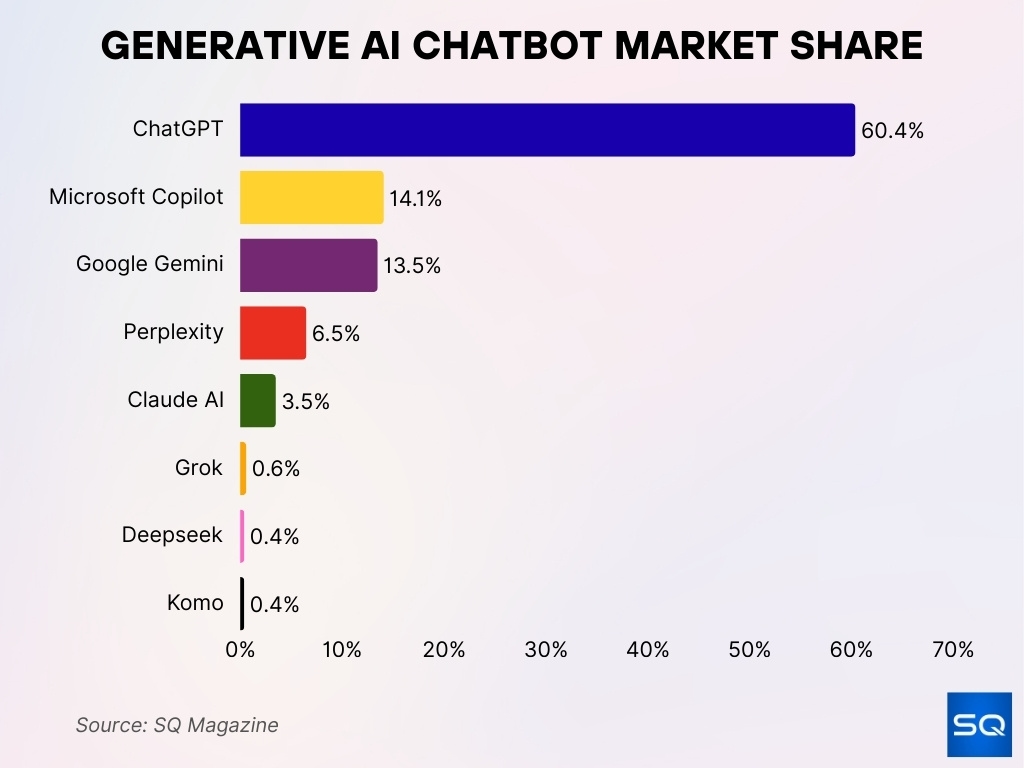
Factual Accuracy and Hallucination Rates
- GPT‑5 demonstrates a significant reduction in hallucination, with a rate of 1.4%, improving upon GPT‑4 (1.8%) and GPT‑4o (1.49%).
- Gemini 2.5 Pro exhibits a 2.6% hallucination rate, indicating competitive but slightly less factual reliability than GPT‑5.
- In financial question-answering tasks, ChatGPT‑4o produces false information 20% of the time, whereas Gemini Advanced hallucinates 76.7% of the time.
- Earlier models of ChatGPT remain problematic, producing factually inaccurate responses in 1 out of every 3 outputs (~33%).
- Studies show hallucination frequency varies by domain, reaching 48% in biomedical prompts, and up to 73% in summarizing complex scientific research.
- Despite improvements, hallucination is still a key concern, particularly in high-stakes fields like medicine, law, and finance.
- A comparative 2025 benchmark across LLMs placed ChatGPT-4.5 among the most accurate, with hallucination rates below 15%, compared to peers often exceeding 30%.
- Gemini’s AI Overviews feature in Google Search led to widespread public criticism, where users observed incorrect outputs in 40–60% of previewed summaries.
- Independent assessments noted that Gemini ranks higher in source citation accuracy, while ChatGPT ranks better in coherent narrative structure.
- Both platforms continue investing in real-time fact-checking capabilities, although neither has completely eliminated factual drift in long responses.
Response Length and Quality
- GPT‑4o supports extended content through up to 128K token contexts, ideal for complex tasks.
- GPT‑4.5 preview, boasting a 1M‑token context, targets deep‑dive writing, but is slower and more costly.
- ChatGPT’s ability to generate structured, multi‑message content has decreased as of May 2025.
- Gemini offers faster response speed, completing tasks more quickly.
- Users value ChatGPT’s interactivity, as it asks clarifying questions before proceeding.
- Both models remain frequently verbose, especially ChatGPT, in technical and research contexts.
- GPT‑5’s leaps in reasoning and precision hint at stronger output quality.
Speed and Real-Time Capabilities
- Gemini’s text completion is now 18% faster, averaging 0.68 seconds of latency.
- GPT‑4o introduced a real‑time API and voice‑enabled interaction with minimal delay.
- Gemini’s integration with Android and Chrome gives it an edge in real‑time utility.
- Tools like Gemini Code Assist and Vertex Media Studio were spotlighted at Google Cloud Next 2025.
- No current latency benchmark for ChatGPT, but Gemini has a real‑time advantage.
- Gemini’s ecosystem reach boosts its real‑time accessibility.
Multimodal Abilities (Text, Image, Audio, Video)
- Gemini was built as a natively multimodal model.
- Gemini 2.5 Pro leads in multimodal reasoning.
- At Google I/O 2025, Veo 3 was unveiled, a video generation tool.
- Med‑Gemini models set new standards in medical imaging analysis.
- On a visual reasoning benchmark, ChatGPT‑o1 topped overall accuracy (82.5%), with Gemini 2.0 Flash close behind at 70.8%.
- Gemini 2.0 Pro demonstrated strong performance in audio and video.
- ChatGPT’s GPT‑4o remains effective for everyday image tasks.
Integration and Accessibility
- Gemini has deep integration across Google products.
- Google is replacing Google Assistant with Gemini on Android devices.
- Tools like Gemini Live, Veo 3, and Jules coding agents enhance Gemini’s reach.
- ChatGPT introduced memory and multimodal interaction in 2025.
Pricing and Subscription Models
- Gemini offers a free base model, with AI Pro (~$19.99/month) and AI Ultra (~£119.99/month) tiers.
- ChatGPT offers both free and paid options; pricing varies by region and features.
Adoption in Enterprises and Organizations
- 65% of marketers and 63% of developers use ChatGPT regularly.
- Over 80% of Fortune 500 companies adopted ChatGPT within nine months of launch.
- 77% of banking executives see platforms like ChatGPT as essential.
- Gemini benefits from integration into Google Cloud, though enterprise data remains sparse.
Data Privacy and Security
- No quantifiable 2025 statistics available.
- Both platforms emphasize user data safety, though hallucinations and misinformation remain concerns.
Conclusion
ChatGPT and Google Gemini each lead in distinct areas. ChatGPT dominates in creative text generation, developer adoption, and enterprise workflows, while Gemini excels in multimodal reasoning, real-time integration, and long-context processing.
From marketing and coding to research and medical imaging, both models are reshaping how we work, create, and explore. As AI evolves, users benefit most by choosing the tool that aligns with their specific task, whether that’s creative writing, contextual video analysis, or productivity across Google’s ecosystem.
Stay tuned for the next wave of innovations, because with generative AI, the only constant is progress.

